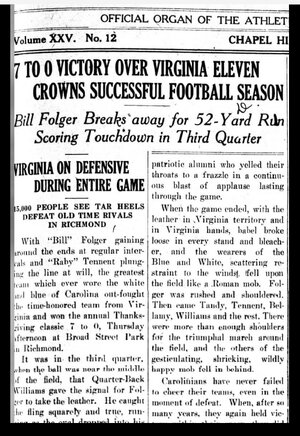
In the early 20th century CAROLINA and Virginia scheduled one another to play out their football rivalry in a Thanksgiving contest. Young Thomas Wolfe made the trip to that game in 1916, played in Richmond that year. Carolina, who had lost 11 in-a-row to the Cavaliers broke that streak with a 7-0 victory. For ‘The Tar Heel’ - the campus newspaper - not yet Daily - Wolfe looked back on the game nostalgically in 1919.
&&&&&&&&&
“YE WHO HAVE BEEN THERE ONLY KNOW”
Thomas Wolfe, December 13, 1919
On to Richmond!
Thanksgiving after Thanksgiving daring would rise that challenge, and the day before the game would see an entire student body migrating. Frantic preparations everywhere, pleading letters to dad, wholesale borrowing from everybody. Bonfires and pep and always more pep, with always some wild eyed dervish leading on in split Carolinas. Do you remember how old Henry, and short Bill Jones and Dean Andy used to campaign for weeks to raise capital enough to make the trip on?
When twilight comes, the long train moves slowly out of Carrboro, to University, to Durham and then North the railheads clicking “On to Richmond, On to Richmond, On to Richmond.” Somehow there is an air abroad that catches men’s enthusiasm. From one end of the train to the other, there is feverish delight. A kind of quivering anticipation for the morrow would prevent one from sleep, coiled up on the red plush seats, even if ambitious fellow travelers would permit it. Some ingenious soul has fabricated a palatial couch, and is just about to sink into sleep when the voice of energy cries in his ear. “On to Richmond” and the arm of enthusiasm dumps him upon the floor of the coach. Dopesters run wild while about them an eager bunch find just how the game is going. Hours of sustained revelry steal away the night and gray morning finds old Richmond stealing by. We come to rest beside the James.
Every man makes his own day. Troop up the streets. Stop at the stands and deck yourself in blue and white. Take your own way, but come at last to the Jefferson and there under the columns yell yourself hoarse in a rapt vindication of the worth of a great football team. Sure we were beaten last year and the year before and . . . but never mind that. Today we win.
March in the wild revolutionary mob to the Park. Crush and crunch yourself into the Broad St. stands and then for an hour and a half forget all these little things of life and living. Somehow your very soul is out there with those eleven men, fighting, fighting in the interest of a cause that you feel to be worthy of any sacrifice.
Was the scene for us or against us? Too often against us. And yet while the bitterness of defeat or the flush of victory is vivid, we know that whatever the result the game was worth while. Strength, cleanness, swiftness, all have been dramatized before us.
Supper, the report of the game, speeches in the Murphy from the lobby table, the Lyric, all pass in swift and dazed before a pair of sleep-blurred eyes. How you ever found your car you do not know, or how you tumbled into a berth or curled up on a seat for that sweet sleep that could come at last when all the shouting and tumult had spent itself.
You come back to the Hill now as you came back then. Once again in your memory let flash the vivid scenes that you will never forget. The touchdown with Bill Folger over the line . . . men chanting victory and dancing in serpentine coils . . . Roy Homewood and his tribe arm and arm through the streets . . . the faculty le-hic-ture at the rear of the homebound car . . . and then with the red dawn of a new college day and a new college generation come back across the campus and with that which thou hast in that heavy ragged suitcase of thine give a toast “To the Days that are Gone.”
‘The Tar Heel,’ December 13, 1919.
&&&&&&&&&
On to Charlottesville with the Ghost of Wolfe in tow.


